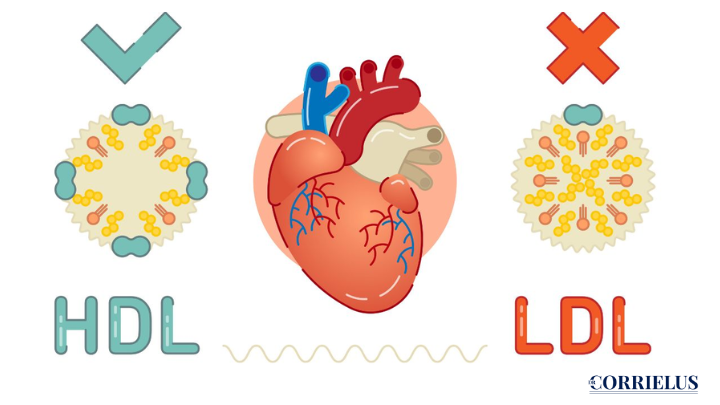Every cell in the body contains cholesterol, a waxy, fatty-like substance. It contributes significantly to the body’s processes, such as hormone synthesis and cell wall synthesis. A buildup of plaque in the arteries brought on by an excess of cholesterol in the blood, however, can raise the risk of heart disease and stroke. The various forms of cholesterol and triglycerides, their effects on your health, and how to control them for the best heart health are all covered in this blog post.
Cholesterol in HDL
Because it aids in the removal of LDL cholesterol from the bloodstream, HDL (High-density lipoprotein) cholesterol is frequently referred to as “good” cholesterol. As a scavenger, HDL cholesterol collects extra LDL cholesterol and transports it to the liver for oxidation and excretion from the body. A lower risk of heart disease is directly linked to higher HDL cholesterol levels.
LDL Cholesterol
Low-density lipoprotein (LDL) cholesterol, which can accumulate in the walls of the arteries and generate a buildup of plaque that can constrict the arteries and raise the risk of heart disease, is frequently referred to as “bad” cholesterol. From the liver, LDL cholesterol transports cholesterol to other parts of the body, including the arteries. An increased risk of heart disease is linked to high levels of LDL cholesterol.
Triglycerides
Blood contains a particular kind of fat called triglycerides. When the body requires energy, they are released from its storage in fat cells. High triglyceride levels in the blood, like LDL cholesterol, can raise the risk of heart disease. Diet, exercise, drinking alcohol, and specific medical problems are just a few examples of things that might have an impact on triglyceride levels.
Managing Your Cholesterol and Triglyceride Levels
There are various things you may do to assist manage high cholesterol or triglyceride levels, including:
1. Keep a healthy weight
In addition to raising your cholesterol and triglyceride levels, being overweight or obese can increase your risk of heart disease. If you are overweight, decreasing just 5 to 10% of your body weight will help to lessen your risk of heart disease and improve your cholesterol and triglyceride levels.
2. Stop smoking
Smoking can increase your LDL cholesterol levels and harm your blood vessels. Quitting smoking can help to lessen your risk of heart disease and improve your cholesterol and triglyceride levels.
3. Moderate alcohol consumption
When you drink alcohol in moderation, your HDL cholesterol levels can go up, but when you drink too much, your triglyceride levels go up and your risk of heart disease goes up. Women should limit their alcohol consumption to one drink per day, while males should limit their consumption to two drinks per day, according to the AHA.
4. Take medication if necessary
In some circumstances, modifying one’s lifestyle may not be sufficient to control excessive triglyceride or cholesterol levels. To assist lower your cholesterol and triglyceride levels and lower your risk of heart disease, your doctor may prescribe medications like statins or fibrates.
A word from the doctor
Knowing your cholesterol and triglyceride levels is a crucial step in ensuring that your heart health is at its best. You can help to manage your cholesterol and triglyceride levels and lower your risk of heart disease by making lifestyle changes like eating a heart-healthy diet, exercising frequently, maintaining a healthy weight, quitting smoking, drinking alcohol in moderation, and taking medication if necessary. It’s important to work with your healthcare provider to determine the best approach for managing your cholesterol and triglyceride levels based on your individual risk factors and health status.
Schedule a consultation with Dr. Sanul Corrielus right away if you have questions about your heart health!



